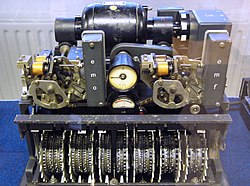
Back ألترا (تعمية) Arabic Ultra (criptologia) Catalan Ultra (Kryptologie) German Επιχείρηση Ultra Greek Ultra Estonian اولترا Persian Ultra (nom de code) French אולטרה HE Ultra ID Ultra (crittografia) Italian
| The Enigma cipher machine |
|---|
| Enigma machine |
| Breaking Enigma |
| Related |
were broken by the Allies to
yield Ultra intelligence
Ultra was the designation adopted by British military intelligence in June 1941 for wartime signals intelligence obtained by breaking high-level encrypted enemy radio and teleprinter communications at the Government Code and Cypher School at Bletchley Park.[1] Ultra eventually became the standard designation among the western Allies for all such intelligence. The name arose because the intelligence obtained was considered more important than that designated by the highest British security classification then used (Most Secret) and so was regarded as being Ultra Secret.[2] Several other cryptonyms had been used for such intelligence.
The code name "Boniface" was used as a cover name for Ultra. In order to ensure that the successful code-breaking did not become apparent to the Germans, British intelligence created a fictional MI6 master spy, Boniface, who controlled a fictional series of agents throughout Germany. Information obtained through code-breaking was often attributed to the human intelligence from the Boniface network.[3][4] The U.S. used the codename Magic for its decrypts from Japanese sources, including the "Purple" cipher.[5]
Much of the German cipher traffic was encrypted on the Enigma machine. Used properly, the German military Enigma would have been virtually unbreakable; in practice, shortcomings in operation allowed it to be broken. The term "Ultra" has often been used almost synonymously with "Enigma decrypts". However, Ultra also encompassed decrypts of the German Lorenz SZ 40/42 machines that were used by the German High Command, and the Hagelin machine.[a]
Many observers, at the time and later, regarded Ultra as immensely valuable to the Allies. Winston Churchill was reported to have told King George VI, when presenting to him Stewart Menzies (head of the Secret Intelligence Service and the person who controlled distribution of Ultra decrypts to the government): "It is thanks to the secret weapon of General Menzies, put into use on all the fronts, that we won the war!"[b] F. W. Winterbotham quoted the western Supreme Allied Commander, Dwight D. Eisenhower, at war's end describing Ultra as having been "decisive" to Allied victory.[7] Sir Harry Hinsley, Bletchley Park veteran and official historian of British Intelligence in World War II, made a similar assessment of Ultra, saying that while the Allies would have won the war without it,[8] "the war would have been something like two years longer, perhaps three years longer, possibly four years longer than it was."[9] However, Hinsley and others have emphasized the difficulties of counterfactual history in attempting such conclusions, and some historians, such as Keegan, have said the shortening might have been as little as the three months it took the United States to deploy the atomic bomb.[8][10][11]
- ^ a b Hinsley & Stripp 1993, p. xx.
- ^ Lewin 2001, p. 64.
- ^ Cox, David (28 November 2014). "The Imitation Game: how Alan Turing played dumb to fool US intelligence - David Cox". The Guardian.
- ^ Smith, Michael (31 October 2011). The Secrets of Station X: How the Bletchley Park codebreakers helped win the war. Biteback Publishing. ISBN 9781849542623 – via Google Books.
- ^ Budiansky, Stephen (27 June 2018). Battle of Wits: The Complete Story of Codebreaking in World War II. Simon and Schuster. ISBN 9780684859323 – via Google Books.
- ^ see: Crypto AG: Hagelin cipher machines
- ^ Winterbotham 1974a, pp. 154, 191.
- ^ a b Hinsley 1993, pp. 11–13.
- ^ Hinsley 1996.
- ^ Keegan, John (2003). Intelligence in Warfare. New York: Alfred A. Knopf.
- ^ Richelson, Jeffery T. (1997). A Century of Spies: Intelligence in the Twentieth Century. New York: Oxford University Press. p. 296. ISBN 9780195113907.
Cite error: There are <ref group=lower-alpha> tags or {{efn}} templates on this page, but the references will not show without a {{reflist|group=lower-alpha}} template or {{notelist}} template (see the help page).
© MMXXIII Rich X Search. We shall prevail. All rights reserved. Rich X Search


